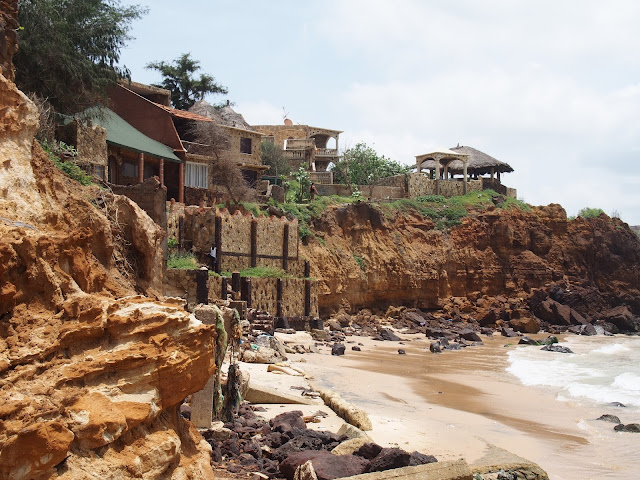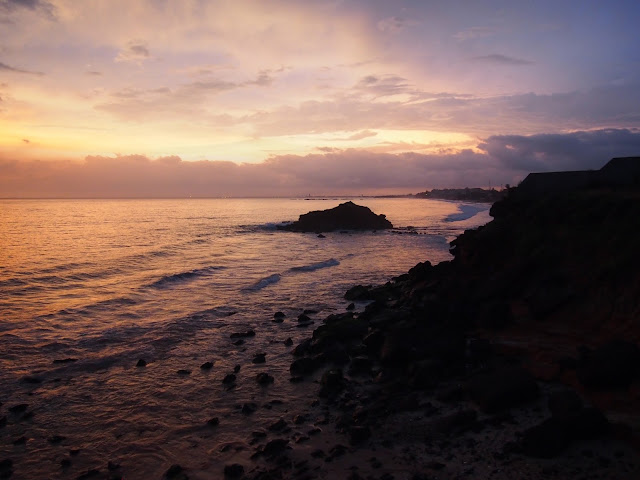Another week has passed by and now I'm only looking at
six more weeks in Senegal. To say that this program is long is both an under
and overstatement, depending on how you feel. I choose not to look at my
experience in Senegal as relative, but it's hard to put aside what my version
of comfort is. At days I reflect and cringe at the fact that Senegal can be neex na (great) when I have a
wonderful interaction with vendors at a marchés,
or that Senegal is nii rekk because
my internship was not particularly enjoyable. The volatility of switching from
both sides of the coin only goes to show how I am still not embracing Senegal
the way I expected it to be - another home. However, the reality is that it
really is another home, but one for four months. School work is picking up now that we
are deep into the semester. Still, it does not compare to the vigor of SUA. I still can go days without finishing or even starting any homework. Life
is blissful, especially if you have wifi at home.
Onto the body of this post: In the first month (I know
I'm still writing about the first month. Really trying to play catch up here),
we spent a week doing a "Rural Visits", which is a week of
experiencing rural life in the interior of Senegal. Granted that some people
spent their week either with internships or in semi-rural areas, most of us
were assigned to outskirts of cities, in pairs or on our own.
I was assigned to a small village called Mbantou in the
Fouta region, located is in the Saint Louis province, north of Senegal. Juliette
and I were attached to a Peace Crops volunteer and his host family, and we
spent six days there. The village only had about 300 inhabitants and it is about a
45 minute walk from the main road. The village does not have any running water,
so we had to pull water from the well every day and we basically lived off bottled
mineral water. There are currently only ten households with running
electricity, and our host family is on the waitlist for the next round of
installations. Greg (our PCV) was extremely nice and showed us
around the area. We ended up visiting Podor, Ndioum, and another Peace Corp
volunteer's house. Our daily routine at the village was breakfast and a bit of
household visitations after. Then it would be too hot to do anything
(temperatures rose above 100°F/40°C) until 4pm, so we will only be relaxing
under neem trees drinking attaya.
It would be cooler in the evenings but we slept outside as the concrete walls radiated heat throughout the night.
It was interesting talking to the families. We learned a lot about the
geography of the area and how life here revolves heavily around the climate and
seasons. It was smack-dab in the middle of hot season when we were there. There were people working in rice fields, but most people chose to wait the heat out.
The Fouta region is considered arid, as it is close enough to the Sahara region
to have a significant climate difference with the rest of Senegal. Mbantou,
however, is in a micro-climate region as it is located next to one of the
tributaries of Fleuve du Sénégal.
Thus, during certain seasons, the water level drops and reveals fertile
banks to carry out small-scaled farming.
The tempo of life is slower than Dakar, with fewer distractions and
more activities carried out on moment-per-moment basis. Men are never involved
with household affairs and mainly sat around. The patriarchal social structure
is more pronounced in the village than what I am used to interacting in Dakar
(be it that it is only with my host family and other direct relations) and gender
roles are stricter and more distinct as well. The Fouta region is much more
conservative, and it most likely has to do with the fact that almost everyone
is Muslim and that religious and traditional practices are strictly upheld. I can get away with showing my calves
and shoulders in Dakar without being too exposed by respectful standards, but
being there, I stuck to covering up until my ankles. At the marriage ceremony I
attended, I had to wear tights underneath my ankle length skirt because I had a
slit running in the back.
There were many different cultural differences with way
of living and exposure between interior Senegal and Dakar. We could never get
from one place to another without being called out as Toubabs (foreigners), granted
that we (in most CIEE students' perspective) get called out in Dakar in many
subtler ways such as taxis stopping for us or stares and unwanted interactions
on a daily basis.
The day we arrived in Mbantou, we were lucky enough to
witness part of a marriage ceremony happening within our host family. One of
the sons or cousins was getting married, and thus, we got to have mutton
(sheep) and pasta, which is considered a special dish in this region. The next
day, we headed to Podor, which was/is a historic town as the French established
a military post there as it is the border town between Senegal and Mauritania.
We treated ourselves to a good meal and had a good time being out and about,
navigating the informal public transportation (which is very different than
informal public transportation in Dakar) systems to get there and back to
Mbantou.
The next few days were a blur of heat, sand and
constantly being dehydrated. We got to cross a river to visit a farmer, who was
the same person who initiated the rice field plantations. I probably had the
best attaya over at his house. We had a good conversation with him about the
preservation of land and the Pulaar language. We then made our way back across
the fast-flowing river on a wobbly plastic container boat, which I did not a
lot of trust in but was sturdier than it looked.
The next evening, we traveled to another Peace Corps
volunteer’s house in another small town where we attended another wedding. This
time, we were with the bride’s family, but things were not very different. In
both weddings, the brides were never seen outside, as was the same case before.
They were escorted to a room upon arrival and were not to be seen until they
left the house. I was uncomfortable at this particular wedding because we came
to learn that she was 16 going on 17, and only had a couple of years left
to complete her Bac (high school diploma). Her husband is in his early 20s and
is a student in Saint Louis, but he hails from a village about 14 hour drive
East from there. According to traditions and their plans, she is to stay with
his family and start being a part of that community. However, she wouldn’t be
able to continue her education as her husband did not agree to it. It was
implied that they will soon start a family, and she would not visit her family
for another few years to come, as she is now married out of the family.
It is one thing to read about things and another thing to
experience these situations firsthand. At one hand, I understand that traditions and
customs should be respected. However, it should not be the case if it outright
deprives one of their basic human rights, especially if it a gendered
situation. I am not particularly eloquent when it comes to talking about issues
such as these, because there are so many others who put things in better
perspectives and have stronger arguments for the right to education and
empowerment of women, and how to navigate through gray areas. But, I am pretty
clear on where I stand.
We travelled back to Dakar the day after, having spent
the day in Ndioum. It was a 9 hour drive over dusty roads, under sweltering heat
and warm wind in our faces. Getting off at the gas station at the end of our
stop, I relieved at the fact that we were back in Dakar. Forget the uninhibited
sweating, forget the constant dust in your bedroom, forget the flies on my
food, forget having frequent whiffs of manure, forget the slow wifi, forget
the frustrations of unstructured everythings. Perceptions of experiences are
ultimately relative. In retrospect I am just humbled by my week in Mbantou, as
I realized that I have settled at a certain level of comfort and privilege. It
was good to be reminded of where I am.
Mauritania right across the river


































































